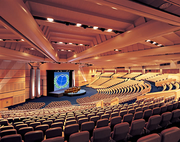Congress of Nations
Congress of Nations مؤتمر الأمم 國國會 Congrès des Nations Конгресс народов Congreso de las Naciones |
||||||
|---|---|---|---|---|---|---|
|
||||||
| Motto: Unita Stabimus, Divisum Declinemus (Latin: United We Stand, Divided We Fall) | ||||||
| CON Executive Headquarters | CON Executive Building, New York City, Gulf Empire | |||||
| Official languages |
|
|||||
| Membership | 13 member states | |||||
| Leaders | ||||||
| - | President | Joseph E. Corbell, Gulf Empire | ||||
| - | President of the IS | Chris Logg, Rizealand | ||||
| - | President of the International People's Assembly | Dr. Isaac Chase III, Rizealand | ||||
| Establishment | ||||||
| - | CON Charter signed | Jan 5, 2014 | ||||
| - | Charter ratified | Feb 5, 2014 | ||||
| Website [http://congressofnations.weebly.com |
||||||
The Congress of Nations (CON) is an intergovernmental organization established in early 2014 by the Bagropa Convention in Rizealand. Its mission has been to further world peace, cooperation, and trade through diplomacy and improved world relations. It was primarily an alternative for the World Assembly which was becoming very abrasive to some nations. Originally formed by Texas, Rizealand, and the Gulf Empire, it has risen to 13 members and has begun to start taking its place among the governments of the world. The CON was patterned in part after the United Nations, European Union, and government of the United States. It is composed of two legislative organs, the International Senate and International People's Assembly and has a Secretariat charged with enforcing laws, presided over by the President of the CON. It also has judicial powers too in the form of the International Supreme Court, International Courts of Justice, and International Courts of Appeal. Some of the biggest changes in its structure include a popularly elected legislative organ (the International People's Assembly), a strong chief executive (the President of the CON), a global currency, and a standing international military for peacekeeping purposes. The meeting places of the CON have been split up between Rizealand, Texas, and the Gulf Empire.
Contents
History
The Congress of Nations was first conceived by President Dominique Horiatio of the Federation of Rizealand and his Secretary of Foreign Relations, Rebecka Abott, in late December of 2013, they called together an international conference in Bagropa, Rizealand to discuss the creation a new international organization. The United Nations had already collapsed by 2008 and was replaced by the World Assembly. However, the World Assembly really only favored larger nations and it did not give enough support to role players, favoring huge regions and gameplay scenarios. The Bagropa Convention was originally made up of representatives from the Federation of Rizealand, Republic of Texas, and the Gulf Empire. These three, known as the "Big Three" decided to draft a new charter for an organization they would call, the Congress of Nations. They decided to craft it have a much more powerful structure then the UN or the even weaker WA while also following some of the old molds of those organizations as well. Rizealand eventually invited Roxia and San Andreas to the convention while the Gulf Empire invited Wadiya and Sunlaya and Texas invited Trafalgar and Dido Place. On January 5, 2014, the Charter was completed and presented to the member nations who ratified it soon after on February 5. Since then, the Congress of Nations has grown to 13 members and bought its own structures.
Structure
The organization of the Congress of Nations was based partially on the United Nations, United States, European Union, and World Assembly. Legislative powers were vested in two organs, like the US, UN, and EU. One organ, resembling the US Senate, Security Council, and Council of Europe, was named the International Senate and was given a lot of power, with its members being appointed by the national governments. The second organ, the International People's Assembly (IPA), was a large lower organ resembling the EU Parliament in which its members would be elected by popular vote rather than appointed. Smaller nations would have an advantage in the International Senate (IS) but larger nations would have an advantage in the IPA, serving as a balance and check. All executive powers were vested in a Secretariat led by the President, who were all chosen by the CON as a whole and by the IS. Lastly, powers was also vested in a system of international courts and an international bank and military force were also applied.
International People's Assembly

International Senate
The International Senate (commonly abbreviated "IS" or "The Senate") is the powerfullest and highest legislative organ of the Congress of Nations. The Senate currently has 26 seats and meets in Austin, Texas at the International Senate Building (ISB). The Senate is representative of the CON's member nations rather than the direct people, unlike the IPA. Each nation sends two senators to the Senate for an indefinite number of terms. The senators have been split into two groups however. The first group or half is appointed to their position by the chief of state or head of government of their nation and is tasked to represent their government's executive branch. The second half is appointed by their nation's legislatures and tasked to represent that legislature. Thus, each nation has one senator representing its executive and one senator representing its legislature. However, in nations where there is no legislature, the person or group exercising legislative powers makes the appointment. The purpose of this is to give each nation equal representation and allow each one an equal voice. The Senate can pass legislation with the IPA, impeach officials charged by the IPA, and declare war with the IPA. However, they can also approve appointments to the secretariat or judicial branches, enact sanctions with 2/3 majority, and admit/eject nations from the CON with a 2/3 majority. The Senate is run similarly to other higher bodies and it does not have a committee system, all debates and discussion taking place on the floor.Secretariat
The Secretariat of the CON is the official name given to the various Secretariats and agencies of the CON. The Secretariat is headed by the President of the Congress of Nations who serves as the chief executive for the whole body. The President is elected every three years by a joint college of the IPA and International Senate. The President has the power to veto or sign legislation passed by either legislative organ of the CON but that organ can override his veto with a 2/3 majority. Other jobs of the President include nominating secretariat officials and international judges, presiding over the Secretariat, and giving the CON a "State of the World" address annually. The President can be impeached by the IPA and removed from office by 2/3 of the Senate. The rest of the Secretariat is comprised of small department or secretariats led by secretaries and charged with enforcing their respective laws. They also serve as cabinet advisers to the International Senate and IPA. The Secretariat meets in the CON Executive Buildings, which are actually the old former UN Headquarters in New York City in the Gulf Empire.
International Courts
The International Supreme Court (ISC) is the highest court and final court of appeal for CON and all its member nations. It is composed of 13 judges, all appointed by the President with support of the International Senate and meets in Geneva in the Gulf Empire. The ISC is responsible for ruling in cases between nations, between nations and individuals, between nations and organizations, and between the CON and other organizations. This court is also the final court of appeal for all civil cases, criminal ones excluded. Usually, to propose a verdict, a majority is needed. Ties result in a mis-trial.Below the ISC is two smaller courts called the International Courts of Justice (ICJ) and the International Courts of Appeal ICA). Each court has 56 judges, a certain number being allotted to each member nation. Judges are appointed by the President of the CON with permission of the International Senate. Both courts meet in an international court building located in each member nation's capital and this courts have jurisdiction only in that state. The ICJ has final appeal for all criminal cases and will listen to cases appealed from member nation courts if the defendant or plaintiff believes that the ruling was unfair or unjust. The ICJ then rules if the ruling was fair or not fair and its decision cannot be appealed any higher. The ICA hears all civil appeal cases from national courts but its rulings can be appealed to the ISC.
Membership
Currently, the Congress of Nations has 13 members. According to the CON Charter, the International Senate is in charge of admitting nations to the CON with a 2/3 majority required. Usually, the Senate rarely rejects applications to join the CON as its belief is the "more the merrier" and it does have the power to eject members but that power has not been exercised yet.
Objectives
The objectives of the Congress of Nations have been to increase free trade by demolishing unnecessary trade barriers, to find ways to protect human rights, to encourage world peace and cooperation, and to prevent violence and acts of war from breaking out. Unlike the UN and WA, the Congress of Nations's approach to this has been through the maintenance of a standing world military, enacting tough sanctions, and creating a global currency.
Funding
The CON's main source of funding comes through special taxes paid by member nations and collected from their citizens. The CON also gets grants and donations from many world agencies and non-profit groups as well.







